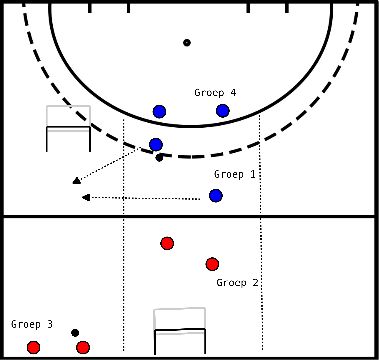Hockey drills for technique defense
- A has the ball and does over the three pawns and chop
- She then plays a 1 vs 1 against B
- B tries to capture the ball and then drive the ball through the gate on the 23-yard line
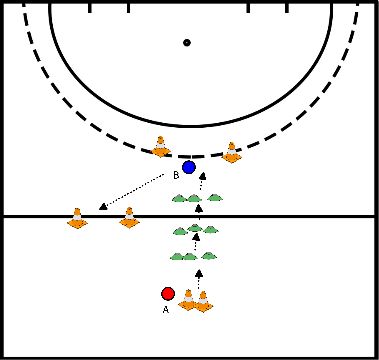
- A plays the ball wide to B, who is ready to receive the ball
- B takes the ball and drives toward the box where they play a 1 vs. 1 against A who is ready to defend
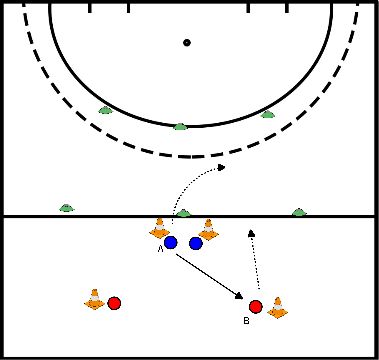
- Use pilons to set up two squares
- Around the dotted head circle (left and right next to/opposite the goal)
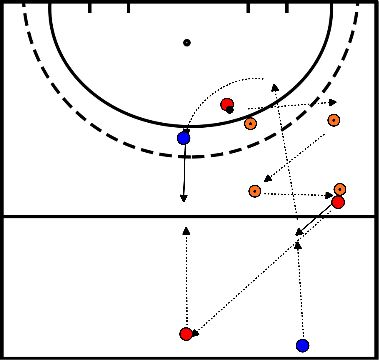
Passing and scoring
- Each pilon has a player on it.
- Player A plays wide to the left to player B and chases the ball.
- Player B plays the ball diagonally to the right to player C and chases the ball
- Player C plays wide to the left to player D and chases the ball
- Player D plays diagonally to the right the ball to player E and chases after the ball
- Player E takes on and scores with flat / stroke
- Player E continues to the left around the extra pilons (out of practice) back to position A
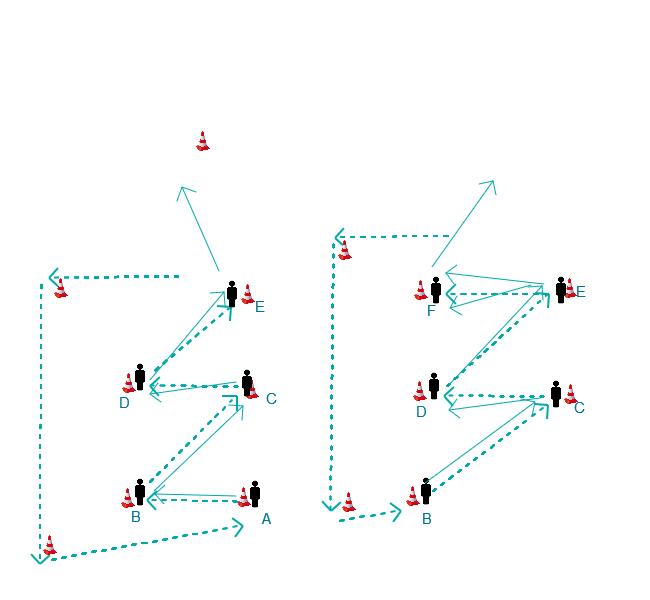
Variation:
- Balls start on the left from position B (pilon/position A is omitted), before that a pilon is added to the edge circle (position F).
- player 1 plays the ball from position B diagonally to the right to player 2 at position C and chases the ball
- Player on C plays wide to left to player in position D and chases after the ball
- Player in position D plays the ball diagonally to the right to player E and chases after the ball
- Player in position E plays wide to the left to player in position F and chases the ball
- Player in position F takes on the fh or high bh and scores with a (backhand) stroke and
- Runs outside the exercise to start position (B)
Variation 2:
- 2 rows of players behind pilons A and B
- Player 1 plays the ball wide to the left and runs straight to position C
- player 2 takes the ball and plays player 1 diagonally to the right in the fh while running (towards position C) and runs straight ahead towards position D.
- player 1 takes the ball in the fh around position C and plays the ball wide / backwards back to player 2 (towards position D) and runs to position E
- player 2 takes the ball (preferably with fh) and with foot position in direction E and plays the ball diagonally forward back to player 1 (direction E: rather just in the circle / edge circle than behind player 1)
- player 1 takes on and strikes / fats as fast as possible towards goal (do not bring the ball back) and runs outside exercise back to position B
Variation on 2:
- After that player 2 has delivered the ball to player 1 the 2nd time / last time, he / she becomes (passive) defender at the next set
- the defender is not allowed to go into the circle (or rather not even behind the line (position C/D) from where he/she started (position D)
- takes off the ball then floats over a line between position A and B.
- The 2 players that come up stay inside the box (width of pass lines) but are free in construction, they may also cross behind, cross over but no passes in the air (no lifts).
- the No. 1 scores and, just like the defender, runs outside back to another position. The No. 2 becomes defender
Accents:
- hands apart while controlling
- foot positioning open
- control it for a follow-up pass or even a quick bounce back
- Score after 2 contacts (control, max 1 other touch)
- see hands/feet position/distance from the ball at hitting and flats accents
You stand in a square and flatten the ball into a square. This is off to 2 sides. The team that scored first gets a 2nd ball and the team that was slower now has to defend the ball.
- A flattens to B
- B flattens to C
- C flattens to D
D scores and either gets a new ball or goes to defend.
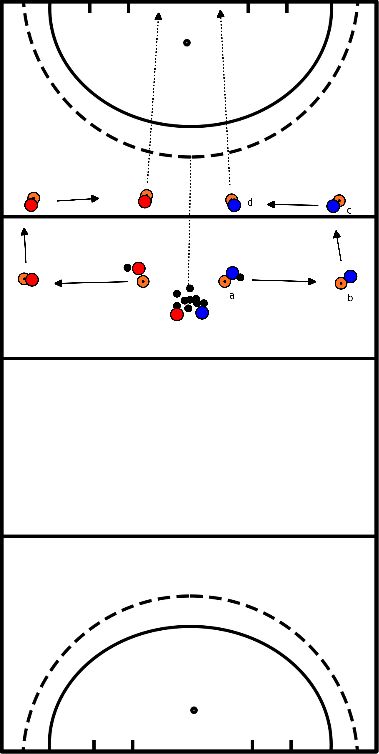
- The balls start at player at 1.
- The player at 1 passes to the player at 2.
- The player at 2 takes the ball and at that point the four players around 2 may start putting pressure on that player.
- The player at 2 must manage to find his way and attempt a pass to someone on his team; orange.
- Can player 2 give the pass, then orange attacks in a 4vs4, can white take the ball away, then white attacks in a 4vs4.
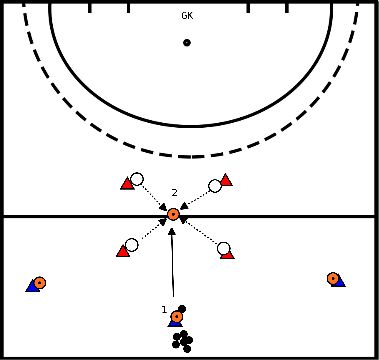
- Passing in the loop
- Do not stand still
- Actively moving from pawn to pawn
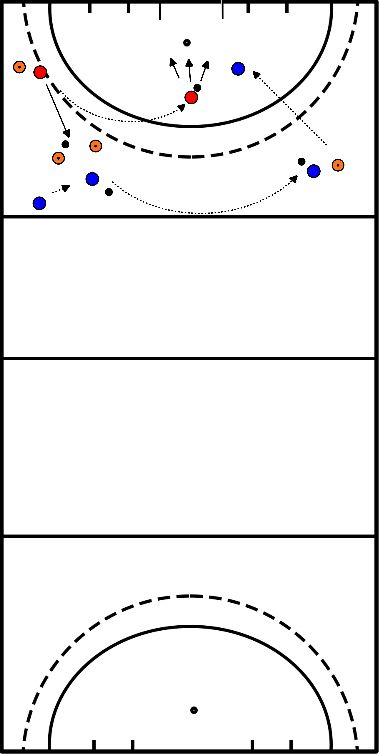
Player A plays the ball, alone, through the restricted area to player B or C.
- Players attack
- Defended by 2 defenders and a goalkeeper
- Ball and players may not pass through the restricted area
Game ends on a goal or a defending player who hit the ball over the sideline.
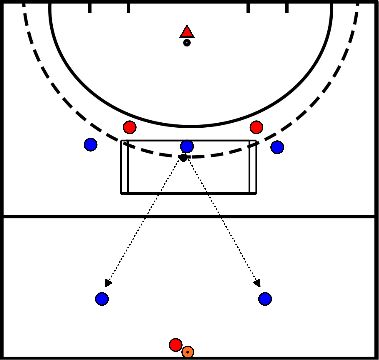
Goal Exercise:
Make high pressure tactics clear to a team.
Make high pressure tactics clear to a team.
- 6 vs. 6
- Setup defense is 4-2 and possible goalkeeper
- Attacking formation is 3-3.
Ball is taken out alternately by defenders and attackers.
Goal of defense
In possession of ball:
Goal of defense
In possession of ball:
- Play ball out and score in 1 of the 2 goals on the center line.
- Form triangles so that someone can always be played.
- Be able to change sides when crowded on 1 side.
No ball possession:
- Play compactly / ensure that the ball + player on the ball guide to the outside.
- Cover the inside of an attacker so that the way to the goal is covered.
Goal attack
In possession of ball:
In possession of ball:
- Attackers compact when ball is in middle of field, when ball is played away to side 1 attacker must run into corner and other 2 attackers assume scoring position in circle.
- Be able to shift ball from side when crowded on 1 side.
No ball possession:
- Attackers high pressure on ball / cover play-off opportunities.
- Midfield compact until ball is on one side and then pressure.
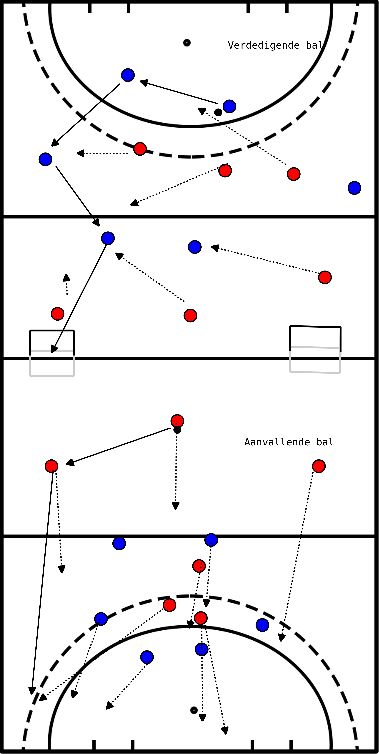
- Attacker on the ball runs up and does a reverse.
- Passes to attacker 2.
- 2 vs. 2 starts.
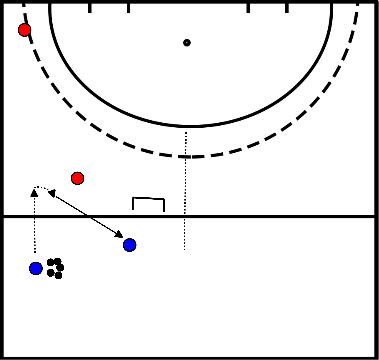
- A starts with a ball and drives into the circle and rounds off
- B plays when A has rounded a ball to V1
- From here the 2 versus 2 starts
- When A and B conquer the ball, they can score in one of the goals on the side
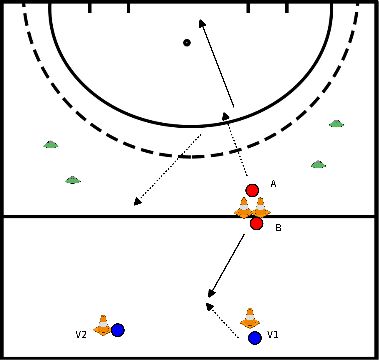
- We always play 2 against 2
- Group 1 plays against group 2
- Group 3 stands ready with a ball, if the ball is out, or scored, group 3 may start, Group 1 then enters that box to defend
- Group 1 against group 3
- Group 4 is ready with a ball, ball out, or scored, group 4 starts with the ball and writes group 3 to defend
- Group 3 against group 4
- And so on
